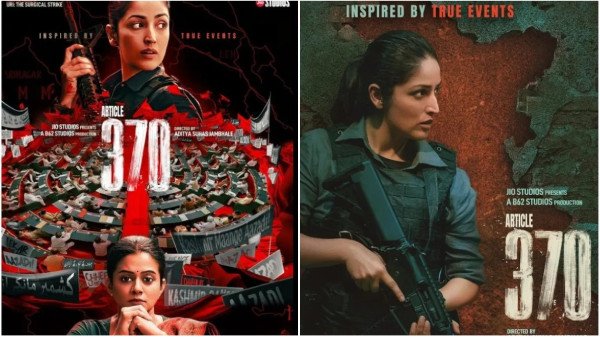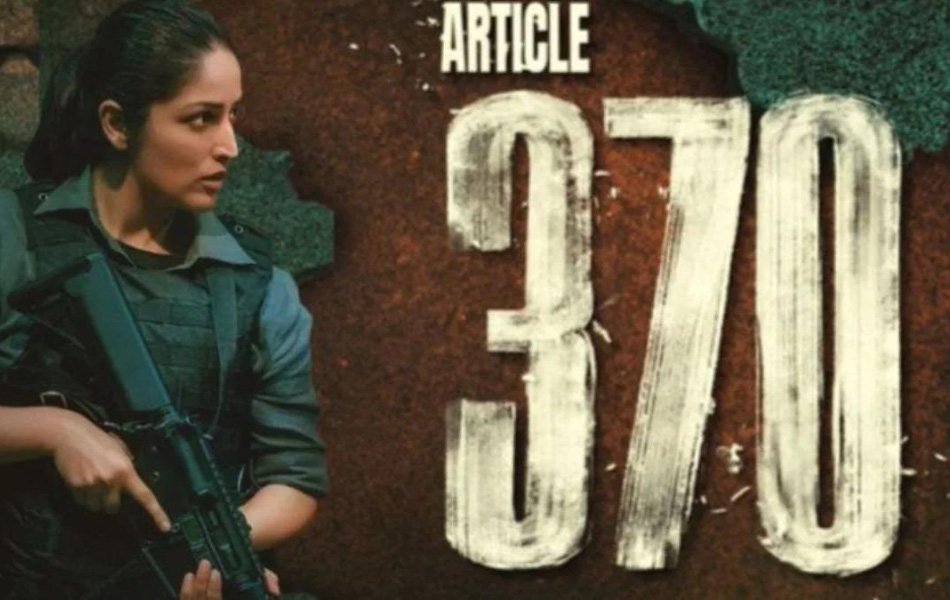“Article 370” opens with a weighty disclaimer, setting the stage for a narrative that walks the fine line between fact and fiction. It begins with sepia-toned glimpses of post-independence India, accompanied by an insightful voiceover from Ajay Devgn, offering a historical context to the contentious Article 370. Directed by Aditya Suhas Jambhale, the film boasts a talented cast including Yami Gautam Dhar, Priya Mani Raj, Kiran Karmarkar, Raj Arjun, and Divya Seth.
Article 370 Movie Review

Contents
Article 370 Movie Plot and Characters:
The protagonist, Zooni Haksar (played by Yami Gautam Dhar), emerges as a complex character, a Kashmiri intelligence operative deeply affected by the ramifications of Article 370. Her father’s tragic suicide, following false accusations related to a bank scam, serves as a personal catalyst in her journey. Zooni embodies the struggle of many Kashmiris, grappling with the consequences of the article’s provisions.
The narrative deftly weaves together political intrigue and personal vendettas, offering a nuanced exploration of the conflict-ridden region. As Zooni navigates the treacherous terrain of Kashmir, her encounters with militants, separatists, and corrupt politicians underscore the multifaceted nature of the issue at hand.
Themes and Commentary:
“Article 370” delves into the complexities of the Kashmir conflict, shedding light on the various stakeholders and their divergent interests. Terrorism is portrayed not merely as a response to oppression but also as a lucrative enterprise, highlighting the commercialization of violence in the valley.

The film critiques the misuse of Article 370 as a shield for vested interests, pointing to its failure in fostering genuine dialogue and progress. While it offers a compelling analysis of the situation, the narrative occasionally falls short in fully exploring the intricacies of the conflict.
Cinematography and Direction:
Aditya Suhas Jambhale’s direction brings a gritty realism to the screen, capturing the palpable tension of the Kashmiri landscape. The action sequences are masterfully choreographed, immersing the audience in the chaos of gunfire and protests.
Performances:
Yami Gautam Dhar delivers a commendable performance as Zooni, infusing her character with depth and vulnerability. Priya Mani Raj shines as Rajeshwari Swaminathan, the methodical Secretary to the PMO, adding gravitas to her portrayal.
Article 370 Movie Cast:
Yami Gautam Dhar, Priya Mani Raj, Kiran Karmarkar, Raj Arjun and Divya Seth.
FAQs: (Frequently asked Questions)
- Is “Article 370” based on true events?
While “Article 370” is inspired by true incidents documented in the public domain, it is a work of fiction and not a documentary. - How does the film depict the role of Article 370 in the Kashmir conflict?
The film portrays Article 370 as a significant hindrance to the development of Kashmir, attributing it as a major factor in the region’s unrest. It suggests that the special status granted by Article 370 shielded militants, separatists, and corrupt politicians, complicating efforts to address terrorism and promote peace. - What are some of the key themes explored in the movie?
Some key themes explored in the movie include the complexities of the Kashmir conflict, the impact of political decisions on individuals and society, the struggle for justice, and the role of intelligence operatives in national security. - How does the cast perform in their respective roles?
The cast delivers commendable performances, with Yami Gautam Dhar shining in the role of Zooni Haksar, a Kashmiri intelligence operative deeply affected by the consequences of Article 370. Priya Mani Raj, Kiran Karmarkar, Raj Arjun, and Divya Seth also deliver noteworthy performances in their respective roles. - What is the director’s approach to portraying the Kashmiri landscape?
The director employs a gritty and realistic approach to portray the Kashmiri landscape, capturing the tension and complexity of the region’s political and social dynamics. The cinematography and setting effectively convey the atmosphere of the conflict-ridden territory. - Does the film offer any insights into potential solutions for the Kashmir conflict?
While the film primarily focuses on depicting the events leading up to the abrogation of Article 370, it does not explicitly offer solutions for the Kashmir conflict. Instead, it presents a narrative that highlights the challenges and complexities involved in addressing the issue. - How accurate is the portrayal of political dynamics in the film?
The film provides a dramatized portrayal of political dynamics, emphasizing the strategic maneuvering of the ruling party and the challenges faced by intelligence agencies in dealing with the Kashmir conflict. While it may take creative liberties, it reflects underlying political tensions and power struggles. - What sets “Article 370” apart from other films on similar topics?
“Article 370” distinguishes itself by offering a nuanced exploration of the Kashmir conflict through the lens of fictional characters and events inspired by real-life incidents. It balances action with political intrigue, providing viewers with insights into the complexities of the region’s socio-political landscape. - Does the film take a particular stance on the abrogation of Article 370?
While the film portrays Article 370 as a barrier to development and peace in Kashmir, it does not explicitly take a stance on its abrogation. Instead, it presents various perspectives and leaves interpretation open to the audience. - What message does the movie aim to convey to its audience?
The movie aims to shed light on the intricate web of political, social, and personal factors contributing to the Kashmir conflict. It underscores the importance of understanding the nuances of the situation and the need for thoughtful consideration in addressing complex issues of national security and regional stability.
Conclusion:
“Article 370” offers a thought-provoking exploration of one of India’s most contentious issues. While it may not provide all the answers, it succeeds in sparking dialogue and raising important questions about the complexities of the Kashmir conflict.










